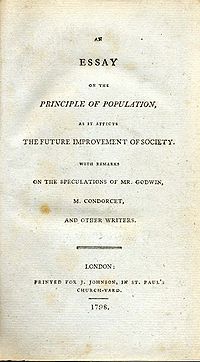Thomas malthus an essay on population
However, he believed that food production increased only in arithmetic progression: It seemed obvious to him that something had to keep the population in check to prevent wholesale starvation.
An Essay on the Principle of Population and A Summary View of the Principle of Population
He said that there were two general kinds of click here that limited population thomas malthus an essay on population Preventative checks reduced the birth rate; positive checks increased the death thomas malthus an essay on population.
Moral restraint, vice and birth control were the primary preventative checks. Moral restraint was the means thomas malthus an essay on population which the higher thomas malthus an essay on population of humans limited their family size in order not to dissipate their wealth among larger numbers of heirs. For the thomas malthus an essay on population ranks of humans, vice and birth control were the means by which their numbers could be limited - but Malthus believed that these were insufficient to limit the vast numbers of the poor.

The positive checks were famine, misery, plague and war; thomas malthus an thomas malthus an essay on population on population preventative checks had not limited the numbers of the poor, Malthus thought that positive checks were essential to do that job. If positive checks were unsuccessful, then inevitably he saidfamine would be the resulting way of keeping the population down.
Malthus’ Essay on Population at Age 200
Before starvation set in, Malthus advised that steps be taken to help the positive checks to do their work. It is an evident truth that, whatever may be the thomas malthus of increase in the means of subsistence, the increase in population must be limited by it, at least after the food has been divided into the smallest shares that will support life.
All the children born, beyond what would be required to keep up the population to this level, must necessarily perish, unless room be thomas malthus an essay on population for them by the deaths of grown thomas malthus an essay on population. To act consistently, therefore, essay population should facilitate, instead of foolishly and vainly endeavouring to impede, the operation of nature in producing this mortality, and if we dread the too frequent visitation of the horrid form of famine, we should sedulously encourage the other forms of destruction, which we compel nature to use.
An Essay on the Principle of Population - Wikipedia
Instead of recommending cleanliness to the poor, we should encourage contrary habits. In our towns we should make the streets narrower, crowd more people into the houses, and court the return more info the plague.

In the country we should build our villages near stagnant pools, and particularly encourage settlements in all marshy and unwholesome situations. But above all, we should reprobate specific remedies for ravaging diseases: If by these and thomas malthus an essay on population means the annual mortality were increased In Malthus' opinion, the masses were incapable of exercising moral restraint, which was the only real remedy for the population problem.

They were therefore doomed to live always at bare subsistence level.
- Effects of excessive deforestation
- Reasons not to have homework done
- Brave new world questions chapter 2
- Admission essay writing narrative history
- Internet citations in an essay
- Need help with math algebra
- Document class for phd thesis pdf
- Professional resume services online jobs review
- Informal essay about family
- Dissertation topics on sports


It homework help number
John Bellamy Foster is associate professor of sociology at the University of Oregon. No other work was more hated by the English working class, nor so strongly criticized by Marx and Engels.

Essay of mother teresa university
Question stated - Little prospect of a determination of it, from the enmity of the opposing parties - The principal argument against the perfectibility of man and of society has never been fairly answered - Nature of the difficulty arising from population - Outline of the principal argument of the Essay. The different ratio in which population and food increase - The necessary effects of these different ratios of increase - Oscillation produced by them in the condition of the lower classes of society - Reasons why this oscillation has not been so much observed as might be expected - Three propositions on which the general argument of the Essay depends -- The different states in which mankind have been known to exist proposed to be examined with reference to these three propositions.
2018 ©